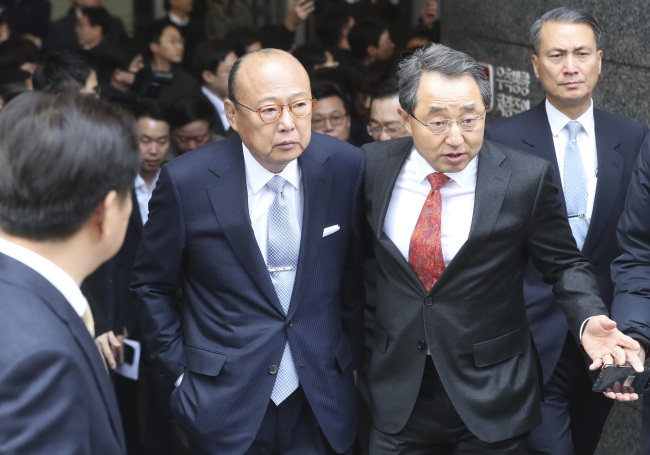Speculation has been circulating that the head of Hanwha Group might return to the management of the nation’s chemical-to-energy giant, as his suspended sentence ordered by the court is nearing its end. The 67-year-old tycoon has kept a low profile for the past seven years.
In 2014, Hanwha Group Chairman Kim Seung-youn was sentenced to three years in jail, suspended for five years, for illegally diverting funds from healthy affiliates to weaker companies he owned. Kim’s sentence ends on Feb. 18, lifting the barrier that had kept him from taking real positions at Hanwha affiliates. However, he has to wait another two years before he is able to take the CEO position at the group’s financial units or companies involved in the convicted crime, which includes its chemical and hotel units.
Upon the final verdict, Kim had stepped down from seven Hanwha companies where he had held the title of chief executive. But he has remained as the group’s chairman, continuing his role as the head of the conglomerate in high-profile events such as meetings with presidents.
 |
Hanwha Group Chairman Kim Seung-youn (Yonhap) |
Hanwha Group, meanwhile, has been tight-lipped about the matter, saying nothing has been decided yet about the chairman’s anticipated roles in its affiliate.
Citing Kim’s history of returning to management in 2007 soon after being granted a presidential pardon, some market watchers said the chairman’s comeback to the corporate world is only “a matter of time.”
Kim has been increasingly making official moves, such as visiting Hanwha’s new plants in Vietnam in December and attending a meeting with President Moon Jae-in last month as the head of Hanwha Group.
Some have even said that Kim has to play a leading role in the nation’s exclusive circle of chaebol scions now filled with those from the third and fourth generations of their families, by taking the chairman position of the Federation of Korean Industries, formerly the biggest business lobbying group here.
Pointing at the nature of Hanwha’s core businesses, such as defense and solar energy, which are deeply tied to the government’s policymaking role, Park Ju-gun, head of local corporate tracker CEO Score, said it is unlikely for Kim to take the chairman position at the FKI, which has been shunned by the Moon administration due to its role in channeling illegal funds from companies to sports foundations set up by a close friend to former President Park Geun-hye.
Rather than pursuing complete leadership in his empire, possibilities are also high for the group to start the process of transferring power to his sons -- particularly to his eldest, Kim Dong-gwan, the de facto head of the group’s cash cow Hanwha Q Cells.
“Hanwha appears to have started the succession scenario already, as it had Hanwha S&C splitting into two units and having the operating unit acquired by Hanwha Systems last year,” said Park.
Hanwha S&C had been criticized as benefiting from internal trading. The company has been viewed as being part of the succession process from the chairman to Kim Dong-gwan. The eldest son’s stake in Hanwha S&C is 50 percent, double that of his brothers.
By Cho Chung-un (
christory@heraldcorp.com)








